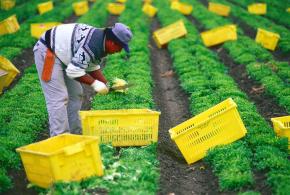Death and profits in the fields of California
reports on the conditions on California farms that are claiming workers' lives.
"WHAT VALUE does a farmworker's life have? Is it less than the life of any other human?"
Arturo Rodriguez, president of the United Farm Workers union, asked these pressing questions when he delivered a eulogy at the funeral of Maria Isabel Vazquez Jimenez.
Maria, a pregnant 17-year-old undocumented farmworker, died on May 16, from heat exposure while working. She was employed by Merced Farm Labor, a contracting company that routinely violated labor laws, according to the UFW.
On the day she died, Maria was working a nine-and-a-half-hour shift, which is more than four hours over the state limit for minors working during business days. The San Jose Mercury News reported, "State authorities suspect that she died because the farm contractor she worked for denied her proper access to shade and water."
In August, Cal/OSHA, which is responsible for enforcing California labor laws, penalized Merced Farm Labor with a $262,700 fine, the highest penalty the agency has ever issued to an agricultural firm. State authorities also want to revoke the company's license.
Merced's fine was higher then usual because state officials concluded that its violations were deliberate. The firm was issued three citations in 2006 for exposing workers to heat stroke by ignoring labor laws. Merced has yet to pay the $2,250 in fine issued in 2006, and it appealed the 2008 fine.
But Merced doesn't stand alone. Vazquez Jimenez's death has drawn statewide attention to the slave-like labor practices in place all over California, and a string of farmworker deaths this summer.
"Farmworkers dying in the fields...is not new. In the past few years, 800 Latino farmworkers have died," longtime farmworker activist Al Rojas said in an interview. Only firefighters suffer from heat stroke at a higher rate than farmworkers, and no occupation sees more deaths from it.
Due to the alarming number of heat-related farmworker deaths, legislation was passed in 2005 requiring employers to provide workers with four cups of water per hour, shaded resting areas, paid break periods of at least five minutes and safety training for employees and supervisors on how to prevent and treat heat exhaustion. These laws were created to prevent deaths like Maria's, yet they aren't being adequately enforced.
"The governor, the UFW and the grower community pushed to pass a law in 2005, but nothing has changed," Rojas explained. "The language of the 2005 labor law was accepted by all, but there were no real deterrents in the law, or accountability for employers or labor contractors...The language doesn't exist...for heavy fines or criminal prosecution of those who knowingly violate the laws."
The San Francisco Chronicle found that there are only 210 state Cal/OSHA inspectors who look for heat-related violations and other safety hazards at farms and all other kinds of work sites. That works out to roughly one inspector for every 90,000 workers in California. "We're doing all we can with the very limited resources we have," Cal/OSHA Chief Len Welsh said.
In fact, Cal/OSHA fails to consistently hold farms and labor contractors accountable for heat deaths or ensure they pay for violations and improve conditions. The penalties that employers face for violating labor laws are minimal and are often ignored. For example, after a 38-year-old man died harvesting lettuce seeds, the farm was assessed a penalty of $13,500. But the farm ultimately paid the state just $250 after appealing the fine.
According to the San Francisco Chronicle, Cal/OSHA conducted 1,018 heat inspections last year and found that 490 companies violated the heat illness laws.
The deaths this summer have made it clear that profits take priority over the farmworkers' lives. As long as companies like Merced Labor place more importance on producing cheap products than on maintaining safety for workers, these easily preventable deaths will continue and increase in number.
Farm labor advocates are demanding actions that would prevent such tragedies. They are calling on lawmakers to pass legislation that would allow farmworkers to unionize more easily. Current laws require that farmworkers unionize at the work site, which makes intimidation tactics easy to carry out. Advocates are pushing for laws that would allow farmworkers to unionize away from work sites.
But it won't be easy. As Rojas put it, "The only power we have is organizing in the streets, organizing workers and boycotting."



